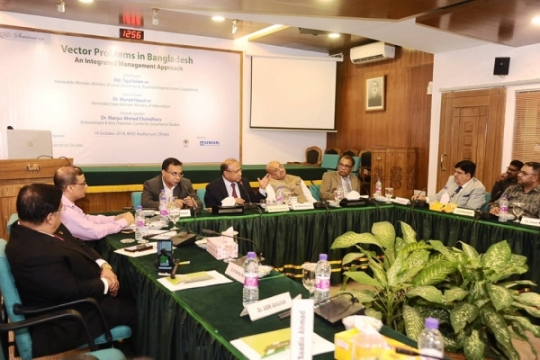Vector Problems in Bangladesh: An Integrated Management Approach
19 October 2019
s1
The Centre for Governance Studies organized a half day Seminar on “Vector Problems in Bangladesh: An Integrated Management Approach” on 19 October 2019 at the auditorium of Bangladesh Institute of International and Strategic Studies. The seminar was held against the background of huge challenges Bangladesh is currently facing to control mosquitoes and other vectors spreading diseases like dengue, chikungunya, malaria, etc. In recent decades, vector-borne diseases like ZIKA virus, West Nile Virus, yellow fever are re-emerging as major global health problem. Bangladesh, due to its geographical location, is vulnerable to this emerging health problem. In coming years and decades, outbreaks, or even epidemics of these re-emerging vector-borne diseases are likely to be severe and more frequent due to climate change, global warming, increased mobility of people and other factors.
This seminar critically examined that while the nation is vulnerable to outbreaks of vector-borne diseases its mosquito control programs are run by different entities under the ministries of health and local government in an uncoordinated manner. The speakers expressed fears that in the coming days Bangladesh could be exposed to severe vector-borne diseases. They said that the possibility of occurrence of other mosquito-borne diseases like ZIKA and West Nile Virus could not be ruled out. They said that it was time for the authorities to introduce systematic surveillance for controlling mosquitoes. Mosquitoes might spread dengue, chikungunya, malaria, filarial, kala-azar and other viral diseases like ZIKA and the West Nile Virus in Bangladesh in future as there is no comprehensive system in place in the country to tackle the vectors, experts said
In his keynote paper, entomologist and CGS vice-chairman Manjur Ahmed Chowdhury said that an integrated vector management program was needed to control and stamp out the vectors. He said that the health ministry was tasked to control malaria and kala-azar, which happen mostly in rural areas, while city authorities have the responsibility to control mosquitoes in urban areas where dengue and chikungunya became causes of concern. Manjur said communicable disease control wing of Health Services maintains a disease surveillance system bedeviled by lack of coordination among the stakeholders.
Different ministries must work collaboratively to eliminate the threat of mosquito-borne disease dengue, said LGRD Minister Md Tajul Islam. “The government is working relentlessly to tackle the disease… different ministries need to work together to prevent dengue,” he said. Bangladesh, like some other Southeast Asian countries, was hit by a massive outbreak of dengue this year. A large number of new cases put a severe strain on the country’s overwhelmed medical system. Since January, 93,361 people were hospitalized with dengue fever -- most of them in Dhaka. Of them, 91,062 have fully recovered. The government has so far confirmed 98 dengue-related deaths. “We’re constantly working to prevent dengue. Initiatives have been taken to create a cell to this end. The local government ministry is working in this regard,” Tajul Islam said in his speech as chief guest. He mentioned that efforts are being made to include information about dengue in textbooks.
Speaking as a special guest at the seminar, State Minister for Information Dr Murad Hasan said it is important to work through inter-ministry initiatives for preventing dengue and other mosquito-borne diseases. Representatives from the two city corporations of Dhaka, doctors, entomologists, scientists, and academics addressed the seminar. CGS Executive Director Zillur Rahman conducted the seminar.
